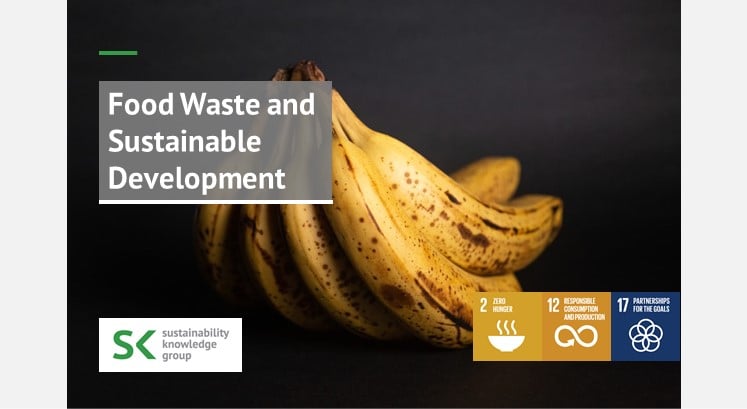Food waste is a significant issue in almost every country. Every year around one billion tons of food is wasted. 61% of this waste comes from households, 26% from food service and 13% from retail. Currently, two billion people in the world are malnourished, and it is expected that by 2050 we will need 60% more food to feed the globe’s population.
With food insecurity spreading to hundreds of millions around the world, addressing food waste is a critical issue for creating low-impact, healthy and resilient food systems. Reducing food waste provides multifaceted gains for people, planet and prosperity. It improves food security, addresses the global problems of climate change, biodiversity loss, and pollution, and reduces burden on waste management systems.
The Food Waste Index and Sustainable Development Goal 12.3
The UN Sustainable Development Goals (SDG) aim to halve food waste by 2030. The United Nations Environment Program (UNEP) published in March 2021 the Food Waste Index 2021 report, which estimates global food waste and a common methodology for measuring and reporting food waste under SDG target 12.3. The Food Waste Index is the first of its kind that highlights the food waste scale and indicates that global food waste is more than twice the size of previous estimates.
According to the report, one billion tons of food is wasted annually at the retail and consumer levels. This food waste generates 8-10% of global greenhouse gas emissions, affecting biodiversity, land and water resources and costing governments, companies and families nearly a trillion US dollars.
Accurate, trackable and comparable measurement is a key starting point for achieving reduced food waste. There are still some data gaps; the significant one is the proportion of inedible parts. As measured in the Food Waste Index, food waste includes both food destined for human consumption and the edible parts associated with it. Understanding how food waste is separated in a particular sector between the edible and non-edible parts will help stakeholders understand the problem and design solutions. Measuring food waste at the retail and food service level will strengthen estimates in most countries, developing national food waste prevention strategies.
The report helps track national progress towards 2030 and achieving SDG 12.3 by:
- More comprehensive food waste collection, analysis and modeling processes, resulting in a new appreciation of global food waste. This will help provide insight into the scale of the problem and into the substantial prevention potential in low, middle and high income countries.
- Disseminating a methodology for countries to measure food waste at the household, food service and retail level. Countries using this methodology will generate strong evidence to guide a national strategy on food waste prevention. In addition to sufficient food waste estimates, to allow meaningful comparisons between countries at the global level.
Estimates for the Food Waste Index will be requested every two years, in line with data requests from the United Nations Statistics Division. For countries that measure for the first time, the base year will be 2021, and for countries with food waste measurements before 2021, they can report food waste every year they have data on it.
Countries and organizations take action
Some countries and organizations have already moved to take measures towards this issue. Australia, Norway and the United States have set targets to reduce the amount of food waste they generate by 50% by 2030 aligning with the SDG 12.3. France and Italy have also banned supermarkets from disposing of unsold food and have required them to donate excess food to charities and food banks.
Only by working together can we prevent unnecessary food waste and protect the planet. UNEP has launched regional working groups on food waste to spur other countries to support countries (Asia and the Pacific, Western Asia, Africa, Latin America and the Caribbean) with less data on food waste. The program will help countries build capacities to measure and reduce food waste, peer-to-peer collaboration, and establish baselines for reporting on SDG 12.3 in 2022 and national strategies to prevent food waste.
Creating a Sustainable Food Future
Food waste is a waste of resources, time and money. To make real change, we need collective efforts and a more inclusive, sustainable and resilient food system. Reducing food waste at all levels can have significant environmental, social and economic benefits. We need to increase efforts to measure food and non-edible parts wasted and track the generation of food waste per capita at the country level. With reliable data, we will track progress in achieving SDG 12.3.
The Food Waste Index encourages countries to use its methodology to measure food waste – at the household, food service, and retail level – to guide national food waste prevention strategies and track progress towards the 2030 goals. At the consumer or household level, the FAO suggests a range of ways to waste less food, such as following a healthy diet, buying only what you need and storing food wisely.
___
Sustainability Knowledge Group is a global Sustainability, ESG and CSR advisory firm dedicated in creating value through strategic advisory and training solutions, coaching and meetups. We work with organisations to develop, manage, and measure effective Sustainability strategies and programs, address social and environmental challenges, and bring tangible results, positive impact and create better businesses.
As a CPD Standards and ILM Recognised Provider, Sustainability Knowledge Group offers certified training courses on Sustainability. To join our trainings and gain the skills and knowledge you need to lead in Sustainability, visit: https://sustainabilityknowledgegroup.com/training
Book now for our next certified training: Advanced Chief Sustainability Officer (CSO) Professional, on 01/06/2021 – 22/06/2021
Photo by Giorgio Trovato on Unsplash

